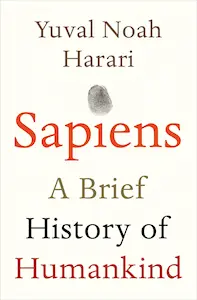Sapiens - Summary
Yuval Noah Harari

Introduction
In his groundbreaking book “Sapiens: A Brief History of Humankind,” Yuval Noah Harari takes readers on a captivating journey through the history of our species. With a unique blend of scientific research, historical analysis, and philosophical insights, Harari explores the key milestones that have shaped Homo sapiens into the dominant species on Earth. This book summary will provide an overview of the main ideas presented in “Sapiens,” highlighting key examples and anecdotes to illustrate the author’s arguments.
The Cognitive Revolution: The Birth of Homo Sapiens
Harari begins by delving into the Cognitive Revolution, a pivotal moment in human history that occurred around 70,000 years ago. This revolution marked the emergence of Homo sapiens as a species with advanced cognitive abilities, including language, imagination, and the ability to cooperate in large numbers. Harari argues that it was these cognitive abilities that enabled humans to surpass other species and establish their dominance.
To support his thesis, Harari presents examples such as the cave paintings found in Lascaux, France, which demonstrate early humans’ capacity for symbolic thinking and artistic expression. He also explores the development of language, highlighting how it allowed humans to communicate complex ideas, form social bonds, and share knowledge, ultimately leading to the rapid spread of Homo sapiens across the globe.
The Agricultural Revolution: From Foragers to Farmers
Moving on to the Agricultural Revolution, Harari examines the transition from a hunter-gatherer lifestyle to settled agriculture, which began around 12,000 years ago. This shift brought about significant changes in human society, including the establishment of permanent settlements, the domestication of plants and animals, and the rise of hierarchical structures.
Harari provides anecdotes from various regions, such as the Fertile Crescent in the Middle East, to illustrate the impact of agriculture on human societies. He explains how the cultivation of crops and the domestication of animals allowed for surplus production, leading to population growth and the development of specialized roles within communities. However, he also highlights the drawbacks of this revolution, including increased social inequality, the spread of diseases, and the rise of oppressive institutions.
The Unification of Humankind: The Power of Imagined Orders
In the next section of the book, Harari explores the concept of imagined orders, which are shared beliefs and narratives that hold societies together. These imagined orders include religions, nations, money, and legal systems, among others. Harari argues that it is the ability to create and believe in these shared fictions that has allowed humans to cooperate on a large scale and build complex societies.
To support his argument, Harari draws upon examples such as the rise of monotheistic religions like Christianity and Islam, which provided a common set of beliefs and values for large populations. He also discusses the role of money as a universal medium of exchange, enabling trade and economic cooperation across vast distances. Harari further explores the impact of imagined orders on social hierarchies, gender roles, and political systems, shedding light on the power dynamics that shape human societies.
The Scientific Revolution: The Triumph of Homo Deus
In the final part of the book, Harari examines the Scientific Revolution and its implications for the future of humankind. He explores how the scientific method, with its emphasis on empirical evidence and critical thinking, has transformed our understanding of the world and enabled unprecedented technological advancements.
Harari discusses various scientific discoveries and innovations, such as the theory of evolution, the Industrial Revolution, and the development of artificial intelligence. He raises thought-provoking questions about the potential consequences of these advancements, including the possibility of humans transcending their biological limitations and becoming a new species, Homo Deus.
Conclusion
“Sapiens: A Brief History of Humankind” by Yuval Noah Harari offers a thought-provoking exploration of the key milestones in human history. Through engaging storytelling and a wide range of examples and anecdotes, Harari presents a compelling argument about the factors that have shaped our species and continue to influence our future. This book summary provides only a glimpse into the rich tapestry of ideas presented in “Sapiens,” encouraging readers to delve deeper into the complexities of our shared human history.